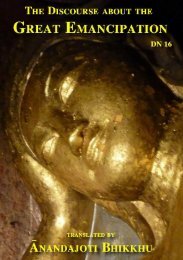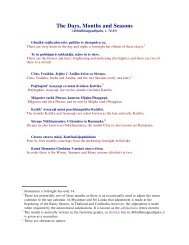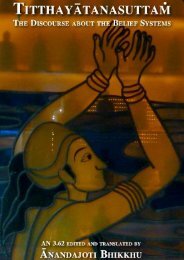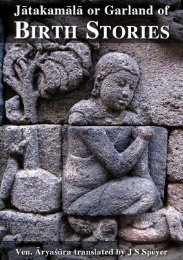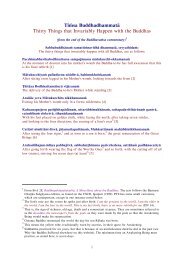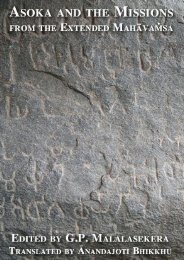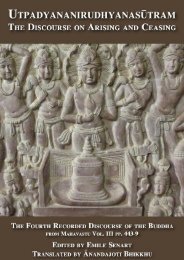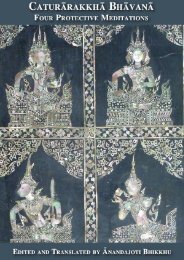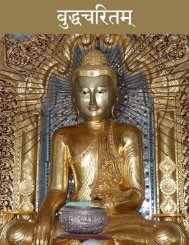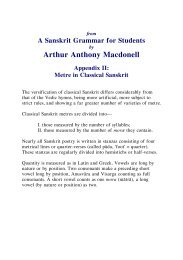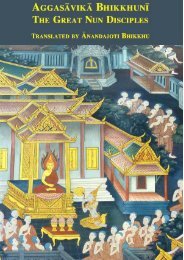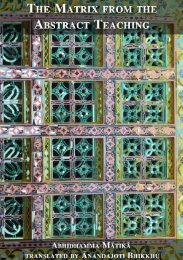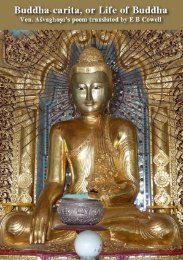MahÄkhandhako The Great Chapter - Ancient Buddhist Texts
MahÄkhandhako The Great Chapter - Ancient Buddhist Texts
MahÄkhandhako The Great Chapter - Ancient Buddhist Texts
Create successful ePaper yourself
Turn your PDF publications into a flip-book with our unique Google optimized e-Paper software.
<strong>The</strong> <strong>Great</strong> <strong>Chapter</strong> - 32<br />
Atha kho Brahmā Sahampati, ekaṁsaṁ uttarāsaṅgaṁ karitvā,<br />
<strong>The</strong>n Brahmā Sahampati, after arranging his upper robe on one shoulder,<br />
dakkhiṇaṁ jāṇumaṇḍalaṁ paṭhaviyaṁ nihantvā,<br />
placing his right knee on the earth,<br />
yena Bhagavā tenañjaliṁ paṇāmetvā, Bhagavantaṁ etad-avoca:<br />
and raising his hands in respectful salutation, said this to the Gracious One:<br />
“Desetu Bhante Bhagavā Dhammaṁ desetu Sugato Dhammaṁ,<br />
“Let the Gracious One preach the Dhamma, venerable Sir, let the Fortunate One<br />
preach the Dhamma,<br />
santi sattā apparajakkhajātikā assavanatā Dhammassa parihāyanti,<br />
there are beings with little dust 82 on the eyes who are perishing through not hearing<br />
the Dhamma,<br />
bhavissanti Dhammassa aññātāro” ti.<br />
there will be those who understand the Dhamma.” 83<br />
Idam-avoca Brahmā Sahampati, idaṁ vatvāna athāparaṁ etad-avoca:<br />
Brahmā Sahampati said this, and after saying this he said something more:<br />
“Pātūr-ahosi Magadhesu pubbe<br />
“Formerly there appeared amongst the Magadhans<br />
Dhammo asuddho samalehi cintito,<br />
An impure Dhamma, invented by those still stained, 84<br />
Apāpuretaṁ Amatassa dvāraṁ<br />
Open this door 85 to the Deathless<br />
Suṇantu Dhammaṁ Vimalenānubuddhaṁ.<br />
Let them hear the Dhamma understood by the Pure One.<br />
82 Comm: rāgadosamoharajaṁ; the dust of passion, hatred, and delusion.<br />
83 Comm: aññātāro ti paṭivijjhitāro; those who understand means those who penetrate.<br />
Although this last clause is awkward, the meaning seems straightforward, and I am not quite<br />
sure how Mrs. C F Rhys-Davids arrives at <strong>The</strong>y who come to know ... will come to be, will<br />
become; or I. Horner, who follows her with: <strong>The</strong>y who learn will grow. BD, IV, p. 8, which<br />
both obscures and changes the meaning.<br />
84 Comm: chahi Satthārehi cintito; invented by the six Teachers. It means the six famous<br />
teachers in Lord Buddha’s time: Pūraṇa Kassapa, Makkhali Gosāla, Ajita Kesakambali,<br />
Pakudha Kaccāyana, Sañjaya Belaṭṭhaputta, and Nigaṇṭha Nāṭaputta.<br />
85 Comm: Amatassa Nibbānassa dvārabhūtaṁ Ariyamaggaṁ; the Noble Path which is the true<br />
door to the Deathless Emancipation.



